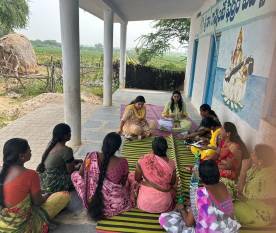NEW DELHI, 22 February 2024: Four inclusive businesses making a difference for India’s farming communities In the heart of India's agricultural landscape, smallholder farmers, comprising 70 per cent of the sector, face a significant barrier: limited access to formal financial institutions and resources.
Instead, they are forced to resort to local money lenders or informal resources, subjecting them to exorbitant interest rates. This reliance on informal finance perpetuates a vicious cycle of indebtedness and limits their ability to invest in activities where they could alleviate their income. Women farmers withstand the worst of this financial exclusion, facing not only restricted access to credit but also a lack of knowledge regarding financial products and management.
Inclusive businesses like Dvara E-Registry, an Agri FinTech startup established in 2019, are crucial in providing financial solutions, farm services and analytics tailored to the needs of marginalized farmers. With a focus on strengthening farmers capacities through Farmer Producer Organizations (FPOs), the Dvara E-Registry has already reached over 61,000 farmers, including 15,000 women.
Unfortunately, financial exclusion is just one of the many issues smallholder farmers face. They form the vast majority of the dairy farmers in the Indian dairy market, yet they suffer significantly from low milk productivity due to factors such as subpar breeds, inadequate access to quality feed and fodder, and a lack of knowledge concerning optimal dairy management practices. The low productivity of the sector constrains the income of farmers and hinders their competitiveness. Many lack formal training in essential areas such as animal healthcare, milking practices, and market knowledge. Inclusive businesses like Sids Farm address this gap by integrating farmers into their value chain, offering capacity building, training in dairy management, and direct procurement. Through this approach, Sids Farm supports over 4,500 smallholder dairy farmers, providing crucial assistance in veterinary care, financial linkages and market access.
Addressing another critical issue in Indian agriculture, Cornext, an AgriTech company based in Hyderabad, aims to solve the fodder deficit issue dairy farmers face by bringing them innovative solutions. The shortage of quality fodder in India poses a significant challenge to the dairy sector and is one of the key contributing factors in its low productivity. The deficit also results in driving up the cost of the feed, worsening the financial burden on the dairy farmers.
Despite the availability of baling technology and silage solutions, due to their excessive costs, size and logistical challenges they pose, they remain inaccessible to the smallholder farmers that need them the most. By leveraging innovative solutions such as Cornext’s baled silage technology, it is possible to reduce these infrastructure costs and to reach the smallholder farmers in remote areas. By offering tailored solutions to farmers to improve their fodder preservation techniques, the company has managed to reach 500 maize farmers and 16,000 dairy farmers across various districts in India, thereby increasing milk productivity and empowering marginalized farmers.
Considering the rich flavour they offer; it should not come as a surprise that there is a significant global demand for Indian spices. Unfortunately, this does not translate to increased incomes for the smallholder farmers that have been cultivating these spices for generations. If a more sustainable supply chain with regenerative agricultural practices were adopted, the farmers would see both economic and environmental benefits. Switching from conventional farming practices, especially when followed for generations, is no easy task. Even the younger generations willing to do so lack training, knowledge, and services in the post-production stages that would provide them with better income for their efforts.
Companies like Jayanti Herbs & Spices, which focus on promoting sustainable and regenerative spice cultivation and provide training, support and direct procurement from farmers, could be key to increasing the marketability and income of these smallholder spice farmers. This way, not only the cultivated spice would be following the global market standards, giving these farmers better market access, the supply chain would become more sustainable.
Access to finance remains a persistent challenge for inclusive businesses aiming to scale up their operations and deepen their impact. Multistakeholder dialogue in inclusive business could serve as a catalyst for these businesses to connect with investors and support organizations, propelling their inclusive models to scale.
One such event was the recent Inclusive Business in Agriculture and Food Systems - Telangana Workshop, where the four enterprises had the opportunity to pitch their inclusive business models to potential investors. These companies are part of the twenty companies that receive inclusive business coaching from the United Nations Economic and Social Commission for Asia and the Pacific (ESCAP) as part of the "Regional Inclusive Business Models in Agriculture and Food Systems's initiative, a collaborative effort between ESCAP and the Bill & Melinda Gates Foundation.
The four enterprises exemplify the rising tide of inclusive businesses in India, each contributing to a more sustainable, equitable and prosperous agricultural sector. As they continue to grow and innovate, they not only uplift farmers but also pave the way for a brighter future for Indian agriculture. With support and investment, these businesses have the potential to catalyse widespread change, transforming the lives of millions across the country.
The article is written by Ignacio Javier Blanco, Programme Officer, Trade, Investment and Innovation Division, United Nations Economic and Social Commission for Asia and the Pacific (ESCAP) & Duygu Cinar, Communications Consultant, Trade, Investment and Innovation Division, ESCAP























